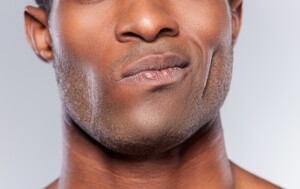
Is BFS in your face driving you mad, all those twitching muscles?
Whether it’s the lips, eyelids, forehead, cheek or jaw, here’s your solutions.
BFS stands for benign fasciculation syndrome. Hopefully, you’re past the stage where you fear that all the muscle twitching suggests a motor neuron disease such as the terminal ALS.
BFS can occur anywhere in the body. However, a person may feel more anxiety, or even fear of ALS, if this benign and common condition is concentrated to their face.
But look at the illustration to the left. Note how many muscle fibers are packed into the human face.
Why shouldn’t BFS affect some individuals only in the face?
After all, the muscles that control facial movement are composed of the same structures, and “fire” the same way from nerve impulses, as do the muscles in the legs, buttocks and arms.
You may also have noticed that the muscles in your face twitch more so when you’re at the computer, watching TV or even lying down at bedtime.
“During movement the muscles are engaged and are tensed, whereas at rest, they are more relaxed,” says Carolyn Dean, MD, ND – Medical Advisory Board Member, Nutritional Magnesium Association at nutritionalmagnesium.org.
When muscles are relaxed, you are more aware of fasciculations. Twitching can be concealed by muscles in a state of contraction, such as when you’re in a heated argument.
When do you feel the BFS in your face arise more: when you’re passionately coaching your kid’s soccer team, using a lot of facial muscles in the process, or when you’re lazily and quietly checking the latest celebrity gossip on the Internet?

Shutterstock/G-Stock Studio
“It is important to note that twitching in general is slightly more severe at night and is exacerbated during periods of stress, exertion or infection, which are all forms of stress that deplete the anti-stress mineral, magnesium,” explains Dr. Dean.
So even though you didn’t feel any fascics while you were yelling to all the soccer players, you may begin feeling them shortly after, due to the fatigue.
“Additionally most patients with benign fasciculation syndrome also suffer from anxiety.
“Some benign fasciculation syndrome patients can have pain during the muscle twitching which may include muscle cramping due to repeated contractions.”
This can occur in your face, for these very reasons. It’s annoying but harmless.
“They may also experience fatigue and a reduced exercise tolerance, all of which are symptoms of magnesium deficiency,” says Dr. Dean.
Solution to BFS in the Face
You probably already know to reduce the anxiety. Certainly you’ve felt the hotspots in your face twitching far more frequently while you’re jumping from one ALS site to another, vs. when you’re viewing the latest viral video of some toddler playing with a puppy.
But there’s another solution, says Dr. Dean: magnesium supplementation.
“In your water stir 1-2 tbsp. of magnesium citrate powder and sip it throughout the day,” advises Dr. Dean.
“Magnesium is a key electrolyte, is known as the anti-stress mineral and affects over 700 enzyme processes in the body and is a co-factor for healthy bones, heart and brain health.
“Magnesium citrate powder is more easily absorbed by the body compared to other forms of magnesium.”
So between becoming more cognizant of your anxiety levels, working hard to not let the small things in life rattle you (e.g., your tween daughter spent only one hour practicing her basketball skills rather than the agreed-upon 90 minutes), and taking magnesium citrate in powder form, you should feel an improvement in your face’s BFS symptoms.
Also keep hydrated to help reduce the symptoms of BFS, particularly the twitching muscles.

Shutterstock/Phovoir
Dr. Dean says for daily water intake: “One-half your body weight (in pounds) in ounces of water. If you weigh 150 pounds you should drink 75 ounces.”
Eyelid twitching can also result from eyestrain at the computer.
When reading a lot, every 20 minutes look 20 feet away for 20 seconds: the 20/20/20 rule.
BFS in only your face is no picnic, but it’s not a sign of ALS or anything to worry about, either.



































